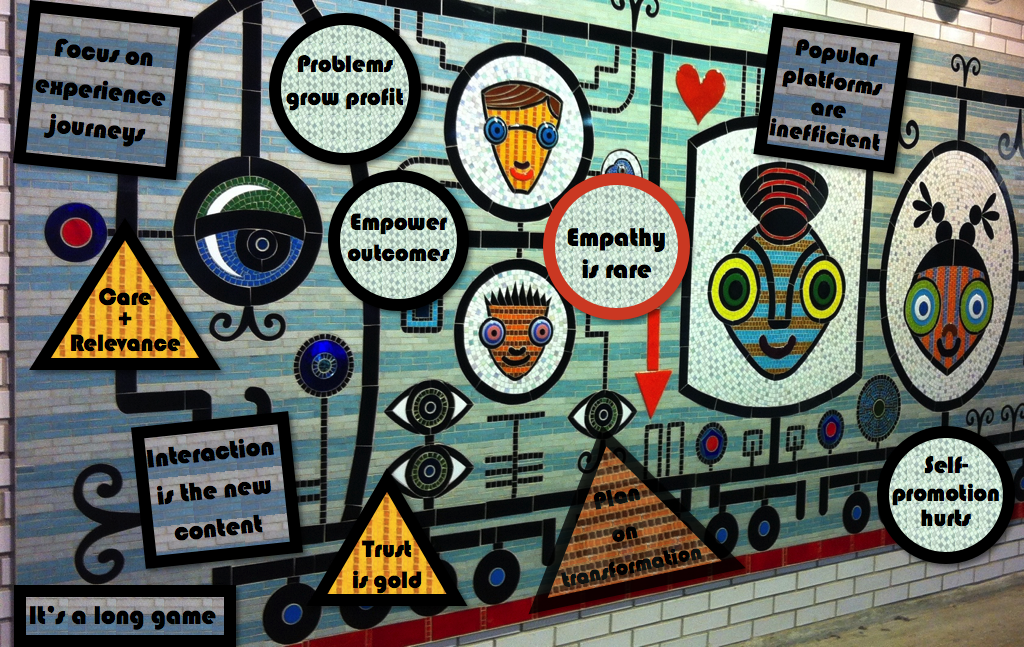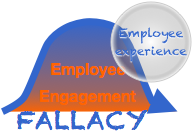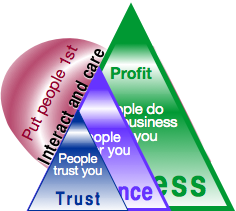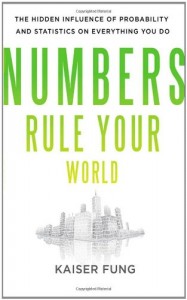 On human experience invites you to examine common marketing practices from a human experience perspective. It expands part of a presentation I gave at the University of Chicago Booth that the audience experienced as mind-bending based on their facial expressions. On human experience invites you to examine common marketing practices from a human experience perspective. It expands part of a presentation I gave at the University of Chicago Booth that the audience experienced as mind-bending based on their facial expressions.
Quite by accident I’ve happened on a rare view of humanity while practicing experiential social media during the last ten years. Experiential’s core research process involves conducting ethnographic research of thousands of people in specific situations. I analyze human behavior in communities in digital public, and it’s very rich, nuanced and complex. Ethnographic yields unparalleled qualitative and quantitative insights into behavior and human experience.
Experiential consistently reveals that many marketing practices repel people rather than attracting them because the environment in which marketing is practiced has completely changed from when these practices developed. Marketing creates mistrust and pushes people away, as I’ll show below. This post attempts to reveal this anachronism to you, so you can correct your practices and take the advantage from your competitors.
[…]
 Behavioral economics autonomy and ethics is a thought experiment on how to approach “doing good” when applying the emerging practice of behavioral economics. Along with big data analytics and cognitive science, behavioral economics affords businesses, governments and other organizations unprecedented impact on individuals’ behavior, even without their consent or awareness. This arouses serious ethical and social dilemmas. Behavioral economics autonomy and ethics is a thought experiment on how to approach “doing good” when applying the emerging practice of behavioral economics. Along with big data analytics and cognitive science, behavioral economics affords businesses, governments and other organizations unprecedented impact on individuals’ behavior, even without their consent or awareness. This arouses serious ethical and social dilemmas.
Every behavioral economics practitioner I’ve met has emphasized the importance of using its practice “for good” in order to help people. Like all other human endeavors, however, “for good” is open to interpretation, so I’ll apply my experience with ethnographic and behavioral analysis of social media to reflect on what “for good” might mean in light of individual and group autonomy.
I also hope this Noodle will be food for thought for executives who hire behavioral economics firms as well as all of us who are invariably its subject. In a similar vein, most designers I know are committed to using design principles to improve user experience, and there’s considerable overlap between design and behavioral economics.
Behavioral economics is […]
Social media strategy lessons learned summarizes eleven golden rules I’ve learned while leading strategy and its execution for global firms. Some of them might surprise you: I’ve come to learn that I have a different perspective on social media strategy since I advised global firms and startups in their corporate strategies before founding CSRA in 2006.

Before diving into lessons learned, let’s specify what we mean by social media strategy. “Strategy” itself is an overused work that denotes some mixture of research and planning. The strategy trade-off is simple: the more research and analysis you do upfront, the more risks you can foresee and account for in your plan. When you put your plan into action, you make fewer mistakes and execute more efficiently. Conversely, “minimum viable”/lean strategy does less research upfront, so the team learns while doing. Neither approach is universally “right,” and both work best for certain situations and firms.
[…]
 The Employee Engagement Fallacy reveals that most literature, papers, and methods are built on faulty Industrial Economy employment attitudes, and it provides an approach that uses experiential social media to help reframe employment and performance. The Employee Engagement Fallacy reveals that most literature, papers, and methods are built on faulty Industrial Economy employment attitudes, and it provides an approach that uses experiential social media to help reframe employment and performance.
Although the idea of “employee engagement” can be a rare opportunity to increase competitiveness, its practice is compromised by well intended but flawed logic.
Here’s the fallacy: Employee “engagement” is the result of employees’ experiences while they’re working at employers. Few engagement programs focus on employees’ experiences, so they fall short.
Engagement is not achieved by a program or initiative that focuses on the outcome. Employers see much more success at achieving the result when they focus on empowering the experiences their employees want when they decide to work at the employer. Experience is the motor of engagement, so empowering experience is the first step of raising productivity and lowering employment costs, two common employee engagement goals. Here’s how it’s done.
[…]
 The Trust-Business Chain Reaction How Trust Monetizes describes one of the most disruptive and untapped forces in business, for it shows how trust monetizes at scale. Firms that act on it first can create exceptional advantage for themselves since the reaction grows geometrically. Here is how the reaction works—and how experiential social media activates it. The Trust-Business Chain Reaction How Trust Monetizes describes one of the most disruptive and untapped forces in business, for it shows how trust monetizes at scale. Firms that act on it first can create exceptional advantage for themselves since the reaction grows geometrically. Here is how the reaction works—and how experiential social media activates it.
The Trust-Business Chain Reaction significantly increases profit and other business results in a surprisingly simple human way. It directly addresses customer experience and employee engagement.
[…]
 Reflections on Trust: The Power of Trusting People to Be True to Themselves delves into how trust works in personal and business situations Reflections on Trust: The Power of Trusting People to Be True to Themselves delves into how trust works in personal and business situations
Many people are talking about trust in business these days. I am, too, because it’s the core of my business as well as my personal life. It just occurred to me that there are often some accidental gotchas within many trust discussions I read, and I’ll explore them in case that’s useful to you. First, I’ll delve into trust a little before sharing some insights on how you can make it actionable in your personal, career, and business relationships.
[…]
 This winter carries a surprising benefit of extreme weather. It has been a bit colder than usual in much of the U.S.A. due to the “Polar Vortex,” and I have observed that many professional groups in Chicago have canceled or postponed events due to “extreme weather” over the past two months. This has started to become a phenomenon, so I’ve been observing it with interest. This winter carries a surprising benefit of extreme weather. It has been a bit colder than usual in much of the U.S.A. due to the “Polar Vortex,” and I have observed that many professional groups in Chicago have canceled or postponed events due to “extreme weather” over the past two months. This has started to become a phenomenon, so I’ve been observing it with interest.
My social business client work involves analyzing digital social networks, and it constantly reveals how people affect each other’s behavior, often in surprising ways. I hypothesize that reactions to this weather phenomenon are having unintended effects, so, in the spirit of all Noodles, I’ll explore some of these deeper meanings and invite your thoughts.
[…]
 Why Machines Won’t Displace Human Workers in the Knowledge Economy is a short thought experiment, in the spirit of all Noodles, which was in response to a post in Wired. In Here’s How to Keep the Robots From Stealing Our Jobs, John Hagel posited that a major rationale for the Knowledge Economy firm would be its role as a “knowledge platform” that enabled people to accelerate their learning and productivity. I highly recommend the post, which sparked many intelligent comments. Why Machines Won’t Displace Human Workers in the Knowledge Economy is a short thought experiment, in the spirit of all Noodles, which was in response to a post in Wired. In Here’s How to Keep the Robots From Stealing Our Jobs, John Hagel posited that a major rationale for the Knowledge Economy firm would be its role as a “knowledge platform” that enabled people to accelerate their learning and productivity. I highly recommend the post, which sparked many intelligent comments.
It’s obvious that many people are having difficulties imagining the world toward which we are hurtling, a world in which machines are getting “smarter” and able to “compete” for work roles that humans now do. In writing The Social Channel App, I thought long and hard about the Knowledge Economy and people’s roles in it, and its main thesis is that everything, from states and enterprises to people and products, will be differentiated in the Social Channel and that “humanness” will assume a much more visible importance in the economy.
[…]
10 Detailed Case Studies + Big Data & Analytics’ New Digital Divide + How to Think Like a Data Scientist Book Review: Numbers Rule Your World/Kaiser Fung
 [UPDATED] Step inside a data scientist’s mind, and learn why probability is the key to profit and how it’s the key to understanding and using big data for better decision making. This fascinating and useful book clearly shows how people misunderstand probability and misuse statistics—and therefore big data—and how the knowledge gap leads to faulty models, thinking and decisions. New winners and losers are emerging in the digital social and big-data age. A new digital divide, people who think like data scientists and use probability to support decision making—and everyone else. The data science group will outperform, and Fung shows how creative, fun and useful data science is. [UPDATED] Step inside a data scientist’s mind, and learn why probability is the key to profit and how it’s the key to understanding and using big data for better decision making. This fascinating and useful book clearly shows how people misunderstand probability and misuse statistics—and therefore big data—and how the knowledge gap leads to faulty models, thinking and decisions. New winners and losers are emerging in the digital social and big-data age. A new digital divide, people who think like data scientists and use probability to support decision making—and everyone else. The data science group will outperform, and Fung shows how creative, fun and useful data science is.
This book is a perfect twin to Duncan Watts’ Everything Is Obvious* Once You Know the Answer, which exposes how common sense pervades management decisions and failure. I shall refer to several specific connections between […]
Digital Transformation’s Personal Issue reveals personal treatment to be the key to breakthrough customer experience, and it shows how digital social spaces enable Chief Digital Officers to use personal treatment to create more profit. Before they arrive, though, they need to lead their organizations through the Personal Issue. 
The Personal Issue refers to a perceived conflict between empowered customers and profit-starved companies. Digital social technologies are enabling customers to “re-personalize” business and society because their online interactions among themselves are personal, which is changing their expectations of all interactions.
However, businesses resist treating customers personally because they fear cost and inefficiency. They don’t understand the digital social economics of treating customers personally online, at scale.
Meanwhile, the missions of chief digital officers (CDOs) and chief customer officers (CCOs) are creating bold new “customer experience” and profits by using digital technologies to transform organizations, brands and businesses. They will fulfill their missions far more quickly and completely by using the key.
[…]
|
|
 On human experience invites you to examine common marketing practices from a human experience perspective. It expands part of a presentation I gave at the University of Chicago Booth that the audience experienced as mind-bending based on their facial expressions.
On human experience invites you to examine common marketing practices from a human experience perspective. It expands part of a presentation I gave at the University of Chicago Booth that the audience experienced as mind-bending based on their facial expressions.
 Behavioral economics autonomy and ethics is a thought experiment on how to approach “doing good” when applying the emerging practice of behavioral economics. Along with big data analytics and cognitive science, behavioral economics affords businesses, governments and other organizations unprecedented impact on individuals’ behavior, even without their consent or awareness. This arouses serious ethical and social dilemmas.
Behavioral economics autonomy and ethics is a thought experiment on how to approach “doing good” when applying the emerging practice of behavioral economics. Along with big data analytics and cognitive science, behavioral economics affords businesses, governments and other organizations unprecedented impact on individuals’ behavior, even without their consent or awareness. This arouses serious ethical and social dilemmas.
 [UPDATED] Step inside a data scientist’s mind, and learn why probability is the key to profit and how it’s the key to understanding and using big data for better decision making. This fascinating and useful book clearly shows how people misunderstand probability and misuse statistics—and therefore big data—and how the knowledge gap leads to faulty models, thinking and decisions. New winners and losers are emerging in the digital social and big-data age. A new digital divide, people who think like data scientists and use probability to support decision making—and everyone else. The data science group will outperform, and Fung shows how creative, fun and useful data science is.
[UPDATED] Step inside a data scientist’s mind, and learn why probability is the key to profit and how it’s the key to understanding and using big data for better decision making. This fascinating and useful book clearly shows how people misunderstand probability and misuse statistics—and therefore big data—and how the knowledge gap leads to faulty models, thinking and decisions. New winners and losers are emerging in the digital social and big-data age. A new digital divide, people who think like data scientists and use probability to support decision making—and everyone else. The data science group will outperform, and Fung shows how creative, fun and useful data science is.